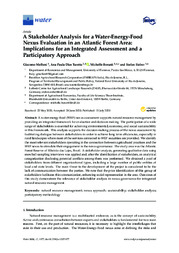A stakeholder analysis for a water-energy-food nexus valuation in an Atlantic Forest area: implications for an integrated assessment and a participatory approach.
A stakeholder analysis for a water-energy-food nexus valuation in an Atlantic Forest area: implications for an integrated assessment and a participatory approach.
Resumo: A water-energy-food (WEF) nexus assessment supports natural resource management by providing an integrated framework for evaluation and decision-making. The participation of a wide range of stakeholders is essential for achieving environmental, economic, and social sustainability in this framework. This analysis supports the decision-making process of the nexus assessment by facilitating dialogue between stakeholders in order to achieve long term efficiencies, especially in rural landscapes where most of the services connected to WEF securities are provided. We identify the most relevant stakeholders operating in the connection between agricultural practices and the WEF nexus to stimulate their engagement in the nexus governance. The study area was the Atlantic Forest Reserve of Ribeirão das Lajes, Brazil. A stakeholder analysis, generating qualitative data using snowball sampling interviews was applied and, after the identification of stakeholders, an analytical categorization disclosing potential conflicts among them was performed. We obtained a pool of stakeholders from different organizational types, including a large number of public entities at local and state levels. The main threat to the development of the project is considered to be the lack of communication between the parties. We note that the prior identification of this group of stakeholders facilitates this communication, enhancing social representation in the area. Outcomes of this study demonstrate the relevance of stakeholder analysis in nexus governance for integrated natural resource management.
Ano de publicação: 2020
Tipo de publicação: Artigo de periódico
Unidade: Embrapa Solos
Observações
1 - Por padrão são exibidas publicações dos últimos 20 anos. Para encontrar publicações mais antigas, configure o filtro ano de publicação, colocando o ano a partir do qual você deseja encontrar publicações. O filtro está na coluna da esquerda na busca acima.
2 - Para ler algumas publicações da Embrapa (apenas as que estão em formato ePub), é necessário ter, no celular ou computador, um desses softwares gratuitos. Sistemas Android: Google Play Livros; IOS: iBooks; Windows e Linux: software Calibre.
Acesse outras publicações
Acesse a Base de Dados da Pesquisa Agropecuária (BDPA) para consultar o acervo completo das bibliotecas da Embrapa.

